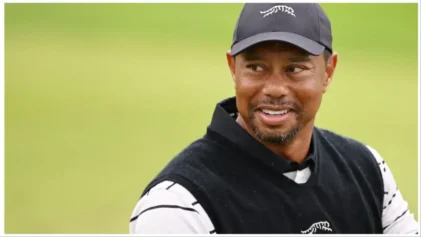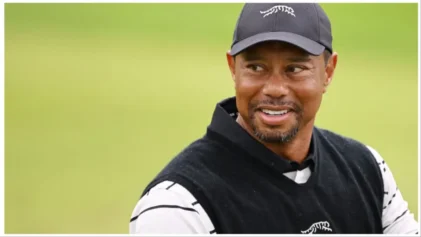How much has your life changed in the past four years? Where were you, and what were you doing this week of June 2008?
For Tiger Woods, that week must seem like part of a different life. It was the last time he won a major golf tournament. It’s where his quest to pass Jack Nicklaus’ record of 18 majors remains frozen.
Woods limped, winced and grunted over five days and 91 holes at Torrey Pines South, claiming his third U.S. Open trophy. Two days later, he declared his season over and said he would submit his left leg to a surgeon for the second time that year.
As he comes to the Olympic Club for this year’s Open, Woods has rediscovered a piece of the ruthless magic that defined his game – while redefining the sport itself – and carried him through that bloody prizefight of a tournament at Torrey Pines. Much of his shot-making wizardry remained intact until the late 2009 tabloid scandal that killed his marriage and put asunder prime endorsement deals. It disappeared for all of 2010 and ’11, then dramatically resurfaced in his win at the Arnold Palmer Invitational at Bay Hill in March and at the Memorial last weekend. But in the majors, the great predator has not returned since that Father’s Day weekend in 2008.
For most of the past three years, he has been ordinary. What is left of the Tiger Woods who demolished Augusta National in 1997 and Pebble Beach in 2000? The one who brought Bethpage Black to heel in 2002, turning a beast into a lapdog? The one who surgically filleted Southern Hills at the 2007 PGA Championship?
If he can reprise the thrill of just one of his 14 major victories, any sentient golf fan would choose to witness a 2008 Open doppelganger. Woods would probably pick another instead, even if that win might have been his proudest moment in the game.
“I think this one is the best, just because of all the things I had to deal with,” Woods said when asked to rank the ’08 Open among his major wins. But relive it? He’d have to be a masochist.
He’d certainly cherry-pick the last six holes of the third round if he could. He shot two eagles and a chip-shot birdie that took a goofy hop off the green and dived obediently into the hole. It looked like the kind of shot Bugs Bunny would make to beat Elmer Fudd. Woods, standing on the slope of the bunker, removed his cap to scratch his head as he laughed in amazement. Caddie Stevie Williams slapped a low-five on his boss, holding onto his hand and pulling him up onto level ground, taking some pressure off his left leg.
Woods stiffly walked toward the hole, his gait a geriatric contrast to his boyish grin. At times, the 32-year-old looked like a contemporary of Rocco Mediate, a 45-year-old enjoying a spectacular reprieve from his perpetually cranky spine. The two of them took the Open into a Monday playoff. Mediate was seeking his first major and needed to topple his sport’s Michael Jordan to make it happen.
He showed up that Monday in a red shirt, mimicking Woods’ final-round fashion tradition. He yakked and yakked, a natural tendency that appeared like gamesmanship against the metronomic Woods. He quickly fell three strokes behind, a typical side effect of playing alongside Woods in his prime. Few recovered. Somehow, Mediate did.
Tied as they reached the par-4 No. 15, Mediate hit his tee shot safely onto the fairway. Woods drove so far to the right that his ball landed in a fairway bunker on the adjoining No. 9. The gallery buzzed. Mediate put his second shot about 28 feet from the hole. Woods marched to the other hole, which offered a nice clearing for him and no bunker lip to overcome since he was playing the fairway trap off its back side.
Still, he needed to reach the 15th green from No. 9’s fairway. And, being the wizard, he did. The ball came to a stop 12 feet from the pin. Mediate’s face said it all: Amazing, hilarious, and then again … of course, he’s 12 feet from birdie, just like that. He’s Tiger Woods.
And then, Mediate countered. When his 28-foot birdie putt went in, the gallery erupted. Woods walked toward his ball, and another roar echoed from the vicinity of the 18th green. The fans there had just watched Mediate’s birdie register on the scoreboard. Woods did not counter. He two-putted for par, and gave Mediate the lead.
At 18, Mediate gave it back for another tie. The first sudden-death hole, No. 7, yielded a Mediate bogey and Woods’ 14th major championship. His wife, Elin, handed their toddler daughter, Sam, to Woods. All three wore red.
If Woods wins at Olympic, that scene won’t be repeated. Elin is gone. So is his swing coach of 2008, Hank Haney, who confided in reporters that Woods’ leg was hurting more than he let on. Haney’s still spilling secrets, but on a publisher’s dime, not Tiger’s. His longtime caddie won’t be there to boost him out of a bunker after a chip-in birdie. Williams was dismissed last year, with a bitter aftertaste.
For Woods to win at Olympic, he’ll have to break a lot of patterns. Of his three U.S. Open victories, none came at a country club. Two came at munis, the magnificent outliers at Bethpage and Torrey Pines, and one at Pebble Beach, posh but open to the public. He would also represent a first in the Open history of the Olympic Club, where the biggest names have never claimed the trophy.
The par-70 course doesn’t play to his strengths. (He tied for 18th when Olympic hosted the 1998 Open.) The other contenders don’t fear him the way they once did.
If he wins here, he might be able to use the same line he did after Torrey Pines: “I think this one is the best, just because of all the things I had to deal with.”
Tiger Woods, Phil Mickelson and Masters champion Bubba Watson will play in the same group for the opening two rounds of the U.S. Open.


